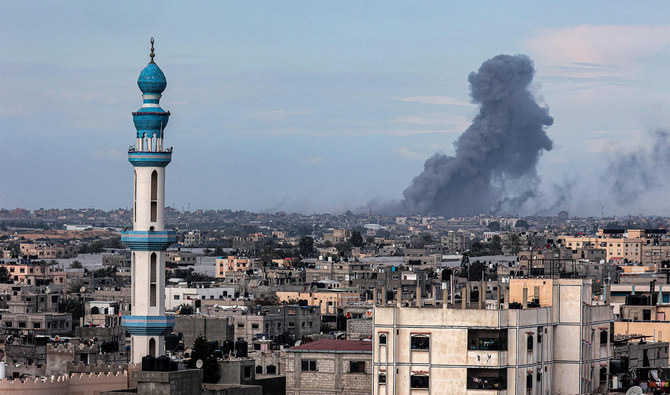ISLAMABAD: Pakistan on Thursday endorsed a statement by the Organization of Islamic Cooperation (OIC) condemning Israel’s ongoing war in Gaza and the expansion of its “indiscriminate attacks” on Rafah city.
Prime Minister Benjamin Netanyahu said on Wednesday Israel would press ahead with an offensive against Hamas in Rafah, the last refuge for displaced Palestinians in southern Gaza, after allowing civilians to vacate the area. The Israeli military says it wants to flush out militants from hideouts in Rafah and free hostages being held there after the Hamas rampage in Israel on Oct. 7.
At least 28,576 Palestinians have been killed, including 103 in the past 24 hours, and 68,291 wounded in Israeli strikes on Gaza since Oct.7, according to the health ministry in Gaza. Many other people are believed to be buried under rubble of destroyed buildings across the densely populated Gaza Strip, much of which is in ruins. Supplies of food, water and other essentials are running out and diseases are spreading.
At least 1,200 Israelis were killed and around 250 were taken hostage in the Hamas raid on southern Israel on Oct. 7, according to Israeli tallies.
“We endorse the statement of OIC strongly condemning the ongoing Israeli military aggression against Gaza and the expansion of indiscriminate attacks on the Rafah city,” the foreign office spokesperson said in a weekly briefing.
“OIC has raised alarm on expansion and escalation of the pace of the Israeli aggression and warned against an unacceptable attempt to forcibly displace the Palestinian people from their own land. Israel’s merciless onslaught against the 1.4 million displaced people in Rafah is a blatant defiance of the provisional measures outlined by the International Court of Justice in its interim order.”
Islamabad called on the United Nations UN Security Council to fulfill its responsibility under the Charter of the United Nations to urgently intervene to impose a ceasefire and bring an end to the killings of Palestinian people.
“The siege of Gaza must be lifted to prevent further deaths and suffering from famine and non-availability of decent medical care. Pakistan stands resolute in its unwavering diplomatic, moral, political, and humanitarian support to the besieged people of Gaza,” the foreign office added.
Israel has vowed to fight on until it eradicates Hamas and has made the return of the last hostages a priority. Hamas says Israel must commit to ending the war and withdrawing from Gaza.
















